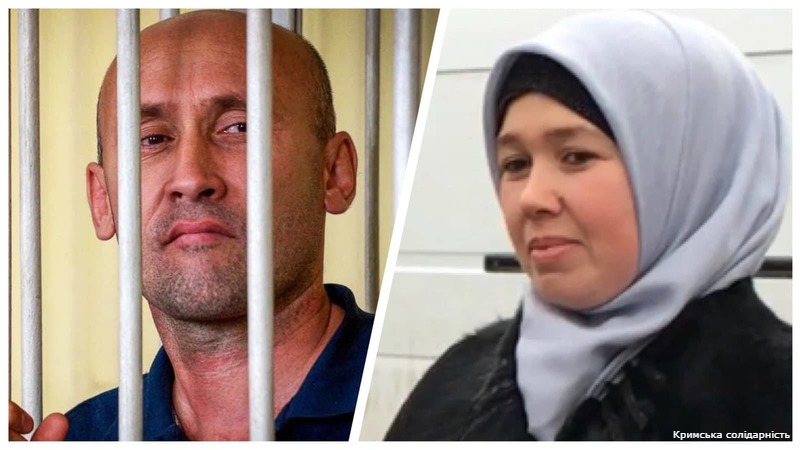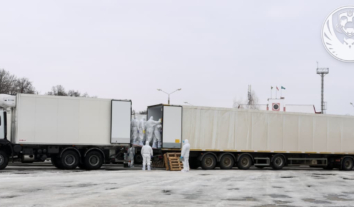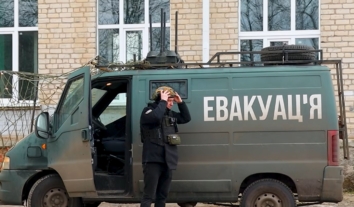The health of political prisoner Zevri Abseitov has significantly deteriorated
During seven years since his detention and imprisonment, the health of Zevri Abseitov, a political prisoner and a representative of the Crimean Tatar community, has deteriorated: he has sore joints and kidneys, hypertension, and dental problems.
Crimean Solidarity, a prominent human rights initiative focusing on Crimean Tatars’ rights and political prisoners, reported this news. Fatma Abseitova, Zevri’s wife, visited her husband with their children in Stavropol colony No. 1 in the village of Kochubeevskoye in the Russian Federation.
 Revzi Abseitov behind bars and his wife, Fatma Abseitova. Source: Crimean Solidarity
Revzi Abseitov behind bars and his wife, Fatma Abseitova. Source: Crimean SolidarityAt the same time, Fatma Abseitova noted that the attitude of the colony’s staff towards the political prisoner was acceptable. According to her, the treatment is the same as for other prisoners.
The political prisoner’s wife and children came for a three-day-long visit. According to Fatma Abseitova, he saw the children – 13-year-old Serdar and 11-year-old Islam – a year after their last meeting.
On May 12, 2016, Russian security forces searched the homes and a local cafe of Muslims and Crimean Tatars in Bakhchisarai, a city in the temporarily occupied Crimean Peninsula since 2014. As a result, they detained and accused four Bakhchisaray residents of terrorism: Zevri Abseitov, Remzi Memetov, Rustem Abiltarov, and Enver Mamutov. They were charged with participating in the organization Hizb ut-Tahrir, recognized as a terrorist organization in Russia but legal in Ukraine and several other European countries.
In December 2018, the North Caucasus District Military Court in Rostov-on-Don, Russia, sentenced Enver Mamutov to 17 years in a strict regime colony. Ruslan Abiltarov, Remzi Memetov, and Zevri Abseitov were imprisoned for nine years.
None of the defendants pleaded guilty. They all stress the ‘politically motivated nature’ of the criminal case.
According to the case file, political prisoners did not have weapons, explosives, or ammunition. They did not plan to commit a terrorist act and did not call on others to commit terrorist acts.
There is also no evidence of an attempt to overthrow the constitutional order of the Russian Federation and seize power.
During the consideration of the defense lawyers’ appeals, the prisoners’ sentences were reduced by three months.
On July 18, 2019, the European Parliament adopted a resolution calling for Russia to release all Ukrainian political prisoners, including those involved in this criminal case.
The Memorial Human Rights Center recognized the defendants in the so-called ‘first’ Bakhchisarai group of the Hizb ut-Tahrir case as political prisoners.
In October last year, Zevri Abseitov’s wife reported that his health had deteriorated significantly during captivity. However, he was not provided with treatment or the necessary medical examination.
Earlier this year, Dunja Mijatović, the Council of Europe Commissioner for Human Rights, released a report, “Crimean Tatars’ struggle for human rights.” Mijatović confirmed numerous serious human rights violations, persecution, discrimination, and stigmatization by Russian occupying forces of representatives of the Crimean Tatars community and those who oppose the illegal occupation of Crimea or disagree with other issues.
According to the Mission of the President of Ukraine in the Autonomous Republic of Crimea, at least 180 individuals are held in custody or imprisoned on the territory of the temporarily occupied Crimea or Russia.
Based on assessments of a human rights organization, Crimea SOS, 35% of political prisoners from Crimea charged with politically motivated grounds became imprisoned after Russia’s full-scale invasion. Most were accused of alleged involvement in the Islamic political organization Hizb ut-Tahrir or the volunteer Crimean Tatar battalion named after Noman Çelebicihan.














